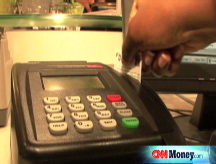Fears of long recession rising
Growing number of economists worry that second-half recovery is out of reach and that recession will be longer and more painful than current forecasts.

NEW YORK (CNNMoney.com) -- There is little debate about whether the U.S. economy is in a recession. The question is how painful and long the downturn will be.
There is a growing fear among some economists that the recession will be particularly bad.
"We just can't believe it's going to be short. The question is how bad can it get? The situation is moving more towards severe than towards mild," said Allen Sinai, chief global economist for Decision Economics.
According to the National Bureau of Economic Research, the firm that officially determines when recessions begin and end, the last two recessions (2001 and 1990-1991) each lasted 8 months.
But Sinai and other economists cited numerous economic headwinds, including tight credit, falling home prices and mounting losses for banks, as reasons why this downturn could last longer and be more painful than seen in those last two recessions, with more job losses and a sharper drop in economic activity.
In addition to the drag on the economy from rising job losses, they also pointed to record high commodity prices and plunging confidence as factors that could cut into consumer spending.
Since consumer spending makes up nearly three-quarters of the nation's economic activity, any decline in spending can create a downward spiral for the whole economy.
"We have a deadly combination of commodity price inflation and credit contraction," said University of Maryland economics professor Peter Morici. "It's tough to imagine a worse combination. In a worst case scenario, the recession could last several years."
The Federal Reserve is still projecting modest growth for the U.S. economy in the second half of this year though, as are many economists. This is based on the belief that the economic stimulus package passed by Congress in February and a series of interest rate cuts by the Fed should lead to higher spending by consumers and businesses in the coming months.
But even Fed policymakers voiced worries of a worse downturn according to the minutes of their March 18 meeting released last week.
Many of the problems facing the economy will come into focus this week as many top bank and Wall Street firms report results and the government will give its latest update on inflation and housing starts.
Citibank (C, Fortune 500), Washington Mutual (WM, Fortune 500) and Merrill Lynch (MER, Fortune 500) are expected to announce additional losses.
Meanwhile, the Consumer Price Index and Producer Price Index, two of the government's key inflation readings, are likely to show big jumps in March compared to February.
But it's the crisis in housing that is of particular concern.
Economists forecast that the Census Bureau will report building permits hit a 17-year low in March and that housing starts were anemic.
And during a conference call with investors Monday, Don Truslow, chief risk officer of banking giant Wachovia (WB, Fortune 500), said home prices should fall through 2008 before finally hitting bottom in the middle of 2009. (Wachovia, the No. 4 U.S. bank by assets, reported an unexpected loss Monday.)
Sinai argues that until housing prices turn around, there isn't much hope for a pick-up in the economy because housing woes will continue be a drag on consumer spending and the credit markets.
"So much borrowing and lending was leveraged to [housing], that as long as values keep going down, the exposure of consumers, of financial institutions and of investors remains extremely high," he said.
Bill Hampel, chief economist for the Credit Union National Association, said the run-up in home prices in the middle of this decade led consumers to take on much higher levels of debt than in the past.
As long as home prices continued to rise, homeowners were able to tap into home equity lines of credit. But with home prices falling and credit suddenly tight, many households have lost this extra source of income. That could create a significant and long-lasting decline in consumer spending.
"What happened in the short space of the last five years was pretty scary -- household debt rose to about 125% of income. It hadn't ever been 100% before that. It took consumers a long time to get into these conditions; it's going to take a long time to get that fixed," Hampel said.
At the same time, consumers are also facing rising prices at the grocery store and gas station. The Fed's rate cuts have cut into the value of the dollar, further increasing the costs of commodities, which impacts the price of food and oil. This may only get worse if the dollar keeps falling.
"It seems to me the big wild card for the economy would be a sharp decline in the dollar, which in turn would cause U.S. inflation to spike up," said Paul Kasriel, chief economist with Northern Trust.
That would be a problem since it would force the Fed to start raising interest rates again in order to make sure inflation does not get out of hand, Kasriel said.
And rate hikes at a time when the economy is trying to rebound from this slowdown could kill any chances of a quick recovery. ![]()







